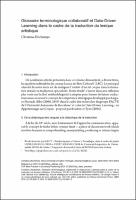Chapter Glossaire terminologique collaboratif et Data-Driven Learning dans le cadre de la traduction du lexique artistique
| dc.contributor.author | Dechamps, Christina | |
| dc.date.accessioned | 2023-08-03T15:02:12Z | |
| dc.date.available | 2023-08-03T15:02:12Z | |
| dc.date.issued | 2023 | |
| dc.identifier | ONIX_20230803_9791221500615_8 | |
| dc.identifier.uri | https://library.oapen.org/handle/20.500.12657/74812 | |
| dc.language | French | |
| dc.relation.ispartofseries | Lessico multilingue dei Beni Culturali | |
| dc.subject.classification | thema EDItEUR::A The Arts | en_US |
| dc.subject.other | translation | |
| dc.subject.other | corpus linguistics | |
| dc.subject.other | terminology | |
| dc.subject.other | lexicography | |
| dc.subject.other | art | |
| dc.subject.other | teaching | |
| dc.title | Chapter Glossaire terminologique collaboratif et Data-Driven Learning dans le cadre de la traduction du lexique artistique | |
| dc.type | chapter | |
| oapen.abstract.otherlanguage | This chapter focuses on the role of corpora, in particular the LBC corpus (Lessico dei Beni Culturali), in the training of (future) translators. First, a variety of teaching methodologies, such as «task», «Learners’ Bilingual Lexicography/Terminography», «Corpus-Based/ Data-Driven Learning», and «strategic competence» will be re-examined, taking into account the use of corpora at all stages of translators’ training. The article will then illustrate a case study involving two translation classes focusing on architecture and art history (including Gothic and Renaissance art). These have led to the writing of a bilingual glossary (Portuguese-French and French-Portuguese), a collaborative and ongoing project for students in translation. | |
| oapen.identifier.doi | 10.36253/979-12-215-0061-5.10 | |
| oapen.relation.isPublishedBy | bf65d21a-78e5-4ba2-983a-dbfa90962870 | |
| oapen.relation.isPartOfBook | 7f85f42a-06ba-4c65-815e-89bb0ea834a7 | |
| oapen.relation.isbn | 9791221500615 | |
| oapen.series.number | 1 | |
| oapen.pages | 13 | |
| oapen.place.publication | Florence |

